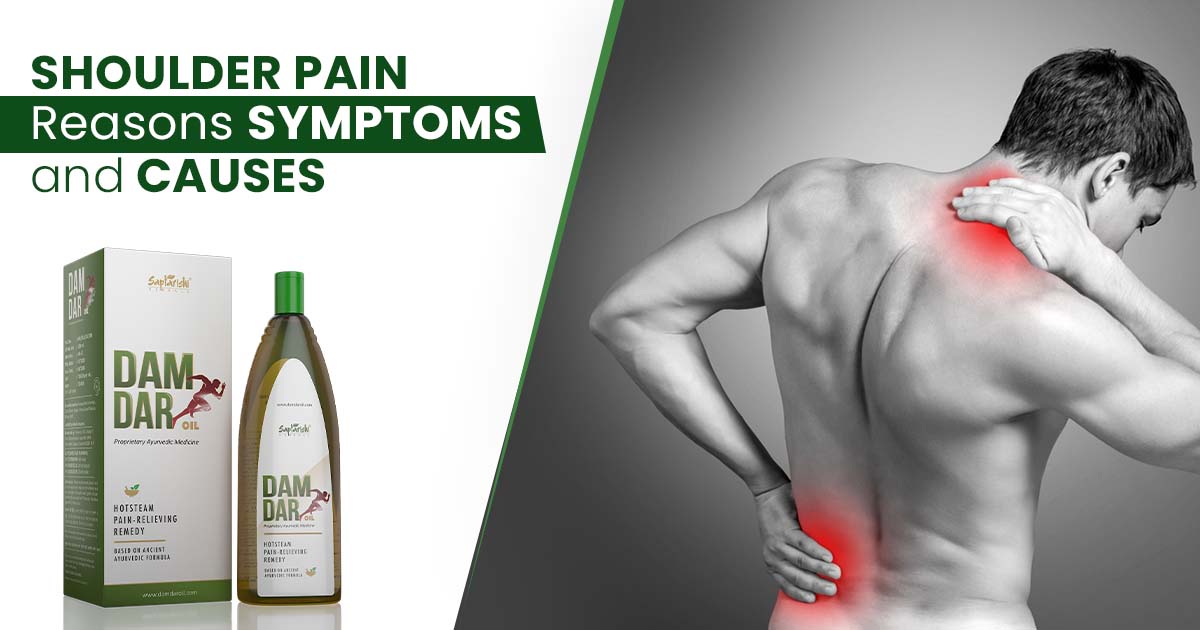Shoulder Pain Reasons, Symptoms, and Causes

With the increase in the use of modern gadgets at home and workplace, the lifestyle of people has changed drastically. They have gotten used to comfort and seldom find time for exercising. The long intervals of constant sitting, bad posture, and lack of movement have led to rigidity of joint muscles resulting in joint problems including shoulder joint pain. Before we find an effective treatment for shoulder pain, we have to find the reasons, other than what we have discussed above, symptoms, and its causes.
Shoulder Pain Reasons
Besides the reasons mentioned above, the other reasons for shoulder pain are:
Injuries and Overuse:
Rotator Cuff Injuries: The four muscles and tendons that support the shoulder joint can become injured or overused, which can lead to severe discomfort and restricted joint mobility.
Bursitis: According to Ayurveda, inflammation of the bursa results from an imbalance of Pitta.
Tendinitis: Another typical cause of shoulder discomfort is vitiation of the Pitta dosha, which can cause irritation, soreness, or swelling in the shoulder tendons.
Structural Issues:
- Frozen Shoulder: In Ayurveda, frozen shoulder or adhesive capsulitis is related to Vata imbalance, which causes stiffness and pain in the shoulder joint that worsens over time. Prolonged immobility is believed to be the cause of a frozen shoulder.
- Shoulder impingement: When the shoulder blades apply pressure on the rotator cuff tendons, it causes pain, reduced range of motion, and inflammation.
Degenerative Conditions:
- Osteoarthritis: The most prevalent type of arthritis or joint inflammation that affects the shoulder and causes pain and stiffness is osteoarthritis. It is caused by the gradual wearing out of cartilage between the bones, which results in friction between the bones that causes discomfort.
- Rheumatoid Arthritis: An autoimmune disease, RA affects the joints of the body, especially the shoulder joints, and can sometimes result in discomfort, inflammation, and distortions.
Referred Pain:
- Cervical Spine Issues: Herniated discs or pressed nerves in the neck produce pain in the shoulder.
- Cardiac Conditions: In a few cases, heart attacks or other heart-related issues show up as shoulder pain, especially in the left shoulder.
Symptoms of Shoulder Pain
The symptoms of shoulder paindepending upon the disparity of doshas are:
Vata Dosha Imbalance
- Sharp, darting pain
- Stiffness, impaired mobility
- Popping or cracking sounds
- Instability of joints
Pitta Dosha Imbalance
- Soreness, burning-type feeling
- Warmth and redness surrounding the shoulder
- Intense and acute pain
Kapha Dosha Imbalance
- Aching, dull pain
- Swelling in the shoulder
- Rigidity especially in the morning and when inactive for long.
Causes of Shoulder Pain
Rotator Cuff Tears: Unexpected injury, recurrent stress, or gradual degeneration.
Dislocation: It happens when the upper arm bone sticks out of the shoulder socket, usually due to trauma.
Fractures: Shoulder fractures.
Frozen Shoulder: An extended period of lack of movement is associated with a frozen shoulder. The real cause is unknown.
Impingement Syndrome: A repetitive motion like painting, playing, or swimming that requires arm movements above the head can lead to impingement syndrome.
Shoulder Arthritis: Osteoarthritis and rheumatoid arthritis result in pain and stiffness.
Shoulder Pain Relief
A combination of treatment and lifestyle changes help manage shoulder pain effectively. Some of them are
Rest: Steer clear of activities that intensify the shoulder pain and discomfort, and give the affected shoulder enough time to recover.
Posture Correction: Don't overstrain your shoulders and muscles, maintain good posture.
Shoulder Stretching: To increase your range of motion and lessen stiffness, gently stretch your shoulders.
Lifestyle Adjustments: To promote general musculoskeletal health, maintain a healthy lifestyle that includes frequent exercise, a balanced diet, and stress-reduction strategies.
Massage: Massaging with natural or ayurvedic joint pain relief oil is preferred due to herbal ingredients that are safe and without any side effects.
Conclusion
Different reasons can cause shoulder pain. Understanding the symptoms and causes is necessary for the prevention and treatment. Shoulder joint pain, shoulder blade pain, or shoulder tip pain, addressing it timely with proper measures can improve one’s quality of life.
